 Bali island in Indonesia is a really special place, with its centuries-old traditions and flamboyant rituals. And the local wedding customs are as original as the culture of Bali. Today, we’ll talk about a royal wedding that took place in Bali several years ago between the half Balinese, half Australian prince Tjok Gus and popular Indonesian TV star Happy Salma. Also, we’ll tell you more about Balinese royal wedding traditions, adorable love stories in the royal family, and a bit strange local wedding rituals.
Bali island in Indonesia is a really special place, with its centuries-old traditions and flamboyant rituals. And the local wedding customs are as original as the culture of Bali. Today, we’ll talk about a royal wedding that took place in Bali several years ago between the half Balinese, half Australian prince Tjok Gus and popular Indonesian TV star Happy Salma. Also, we’ll tell you more about Balinese royal wedding traditions, adorable love stories in the royal family, and a bit strange local wedding rituals.
The countdown to a Bali high wedding has begun. At the royal palace of Ubud, villagers from far and wide are carrying out this centuries-old Balinese wedding traditions.
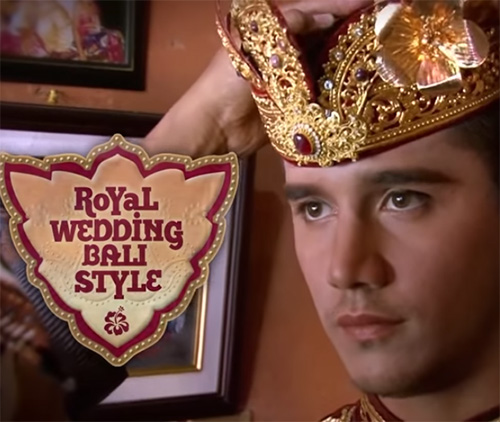
At the center of it all is the mother of the royal groom, an Australian-Balinese princess. Organizing a wedding is stressful for any mother. What if you are also expected to supervise complex Hindu traditions, observe royal protocols, and your son – the prince – is marrying a celebrity, Indonesian actress?
With only a week to go before the big day, hundreds of villagers arrive daily with their donations of ritual offerings and food tributes to their revered royal family.
It's also a chance to get close to the celebrity bride. Happy Salma – adored Indonesian TV star.
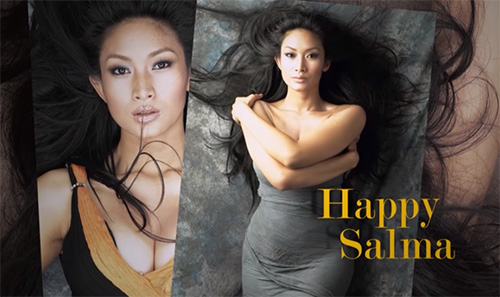
Happy Salma, the bride
“I’m nervous for my wedding, excited too”, says Happy Salma, the bride.
It's the whole new world for Happy, a Muslim from Java, but for prince Tjok Gus, a Hindu, their marriage ceremony is a familiar part of his people's spiritual life.
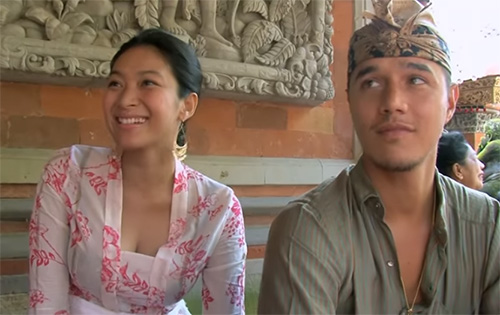
Bride and groom
“Balinese wedding is different to anywhere in the world. It's kind of a mix between animistic and Buddhist and Hindu beliefs. It's something that's unique to Bali. And, of course, being Balinese, for me it's important”, says prince Tjok Gus, the groom.
“I don't think she's [Happy Salma] ever seen a Balinese wedding. I don't think you can ever be prepared for what's happening. It's probably better not to be”, comments princess Asri, groom’s mother.
The head of this extended royal family of about 300 members is princess Asri’s husband, the groom's father.
“My name is Tjokorda Raka Kerthyasa. I come from the warrior family. We can trace up to 24 generations back”, says the King of Ubud (Bali), groom’s father.
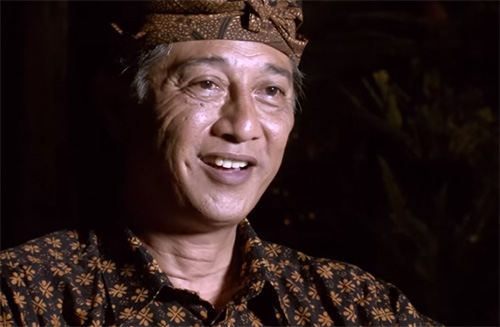
Tjokorda Raka Kerthyasa, King of Ubud (Bali)
Until the early 1900s and Dutch colonial rule, the royal family were the feudal monarchs of Ubud. Ubud lies in the interior of Bali. And the heart of Ubud is Puri Ubud, the royal palace. It's the cultural center of Bali, renowned for its spirituality. Balinese Hinduism, mixed with an ancient reference for the natural world, is part of the fabric of daily life. And the villagers look to the palace as custodians of their faith.
Back in 2004, the royal family presided over the biggest funeral ceremony in living memory – the cremation of the daughter of the last true king of Bali, a woman regarded for most of the last century as a living goddess.
In 2004, princess Asri’s daughter princess Maya was an 11-year-old schoolgirl, boarding in Sydney for most of the year. She came to Bali to honor her grandmother and fulfilled the role she was born to, a Balinese princess.
Ubud’s royal ceremonies bring together thousands of local people, a community of over 69 villages.
And in 2011, seven years later, the community is once again preparing for another royal event in Ubud. This time, the wedding of a prince.
Princess Asri and her husband prince Tjokorda Raka are hosting a party for their royal family and everyone is invited. As princess Asri entertains her royal in-laws, it's a world away from the reception she received as a young bride-to-be 32 years ago.
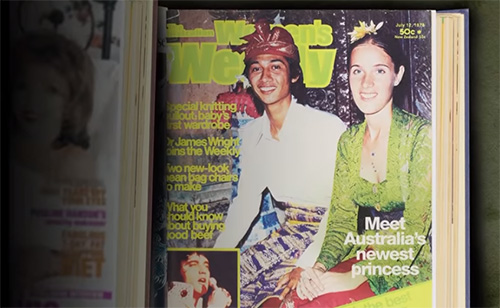
Tjokorda Raka and princess Asri in 1979
It was 1977 and the 23-year-old kindergarten teacher from Sydney, holidaying in Ubud, fell for the local children's theater director – a prince. Jane's (her name used to be Jane Gillespie before her marriage with the prince) parents hadn't expected a holiday romance would lead to her marrying the Balinese prince.
As the youngest son of his father's 10th wife, the prince was expected to marry within the Balinese royal family.
“There was quite a lot of opposition to it and people trying to talk him out of it, and took my passport away, and had me checked out in Interpol”, remembers princess Asri.
The prince Tjokorda Raka refused to bow to family’s pressure and, in 1978, made an Australian commoner a Balinese princess.
For newlywed princess Asri, palace life was far from palatial. They didn't have electricity, running water, refrigeration, telephones, and so on. With the arrival of their first child, life in the palace became even harder for Asri.
“For a person with the degree in child psychology and child rearing, being told ‘you can't do this’, ‘you can't do that’… And I had my mother-in-law sleeping outside the door and knocking on the door every time there was a whimper. It was quite difficult. I remember having to lock myself in my room sometimes. The biggest challenges were our own cultural differences and expectations, I guess. He had a lot of apologizing to do to his family, I suppose, for me. I had also learned to bite my tongue. It was a steep learning curve for both of us to understand each other's culture”, narrates princess Asri.
32 years on, Asri has seen Ubud’s tourism and prosperity transform the once rural community. Increased wealth means Balinese royal weddings are observed far more lavishly.
For Tjok Gus and Happy, Asri's wedding portrait is a picture of days long gone.
“Today in Bali, it's not just for family, people are much more affluent and they spend their money on ceremony, so it's more of a big show now than it was in those days”, adds princess Asri, groom’s mother.
The head of the royal family prince Tjokorda Raka is keeping an eye on the royal invitation committee.
But in Bali, not all invitations come printed on paper. The groom's father and older brother prince Tjok GDe (Tjokorda Gede Mahatma Putra Kerthyasa) are supervising the preparation of invitations made of food.
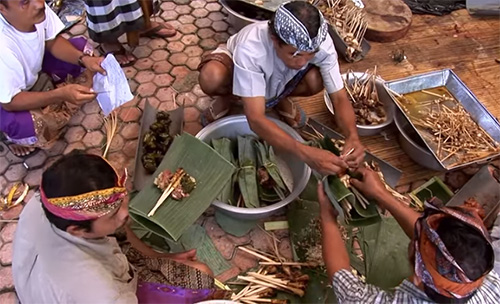
“These are like a cultural invitation. The traditional way that you send out an invitation to family and to other people within your sort of cultural circle”, says prince Tjok Gde, best man and groom’s brother.
While the women are busy making elaborate decorative offerings for the wedding, it's traditionally the men who prepare these customary food invitations. There are strict conventions to observe with the pork satays.
“They have to count the sticks of the satay. For the High Priest, it should be 22 sticks, for the more important person it becomes 16 sticks. It becomes recognized how important the person is, whom we’ll be sending the food”, explains prince Tjokorda Raka, groom’s father.
“The invitations will go out in pickup trucks all over the place. And they'll deliver them personally”, adds prince Tjok Gde, best man.
As the traditional invitations are delivered to hundreds of royals, high priests, and village elders in Ubud, down south, on Bali surf coast, the groom is personally delivering wedding invites to his mates.
“My full name is Tjokorda Bagus Dwi Santana Kerthyasa. Also, I’m called Max by a lot of Western people because that’s how I was called when I was kid in Sydney. I grew up like normal kid in Sydney. We used to come back every year, always kind of had a little taste of Balinese culture”, tells us the groom.
When Asri and Tjokorda Raka decided to educate their three children in Australia, it meant leaving Bali and living as Aussies.
“I was born in Bali and, when you're born here, they bury your placenta. And there’s a saying that the Balinese are a type of people who find it very hard to move abroad – it's because your placenta is buried here rather than castaway. We moved back and forth a lot, though. I still get a bit confused sometimes, but they're just such different cultures. They're like a polarance, even though they’re seemingly close”, says prince Tjok Gde, best man.
For his sister princess Maya, these cultural differences were unforgiving.
“Growing up was really difficult. The main conflict for me is, being a young girl, there's just such a difference between what's acceptable for a young woman to do within the Western culture and within the Indonesian culture. There's also a little bit of prejudice because you're a half Asian. And so it's kind of difficult to deal with you never know exactly where you fit in and exactly where you're accepted”, comments princess Tjokorda Sri Maya, groom’s sister.
With a royal family now permanently back in Bali for over a decade, prince Tjokorda Raka has become the head of culture and religion in Ubud with the title of “The Wise One”.
Growing up in the West didn't sever cultural ties for the royal children. As a teenager, Max left Sydney to live permanently in Bali as prince Tjok Gus.
“Max has always been a Bali boy. His life is here. He's lived in Australia but he prefers it here”, says princess Asri, groom’s mother.
And like his father before him, Max met his bride on her holiday in Bali.
“Happy and I met when she was here on holiday with one of her friends, and then we all went to the beach. That's how we first met. After that, things got a bit more serious”, says prince Tjok Gus, the groom.
Happy comes from Java, an Indonesian island with very different cultural and religious traditions. Like Asri before her, Happy has a lot to learn to become part of this Balinese royal family.
“A wedding in Indonesia is not only marrying with the man, like me with Tjok Gus, but I'm marrying all the family. Like Tjok Gus marries with me, he marries my family too”, says Happy Salma, the bride.
And for Happy Salma, the TV star, there's another family – her millions of devoted Indonesian fans.
“Some of my cousins and other family… people questioning, ‘Oh, you will have an actress’… And look, I don't know what they expect”, comments prince Tjokorda Raka, groom’s father.
“I never think of her as a celebrity. She's just now my daughter-in-law”, adds princess Asri, groom’s mother.
Supervised by Marianna (Tjok Gde’s wife), her sister-in-law-to-be, Happy is on a crash cultural course – learning how to make Hindu offerings for her royal wedding.
“Bali is still different and they really have a strong personality and they really have a strong energy, so I’m still learning”, says Happy Salma, the bride.
A member of an aristocratic family herself, Marianna had her own struggles when she fell in love with Prince Tjok Gde.
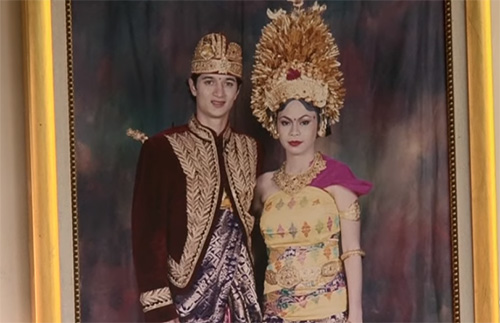
Prince Tjok Gde with his bride Marianna
“I’m from Catholic family. When I moved to Bali and hung out with him… ‘I’ve got a Balinese boy-friend, and he’s Hindu’. My family was kind of like ‘Oh, he’s Hindu?’ I used to work in a Chiropractic clinic in Kuta. He was one of the patients. Chiropractors fix the back. He got a broken heart, so I had to fix it”, says Marianna, Tjok Gde’s wife.
After overcoming her family's initial reservations, Marianna and Tjok Gde became another love match for his royal family.
“That's probably something that we’ve learned from our father. The traditional accepted thing to do is to marry within the same class, someone from the same regional palace or the neighboring palaces. There's still a lot of alliances forming even today, many of the young generation are still doing that”, comments prince Tjok Gde, best man.
The 83-year-old royal matriarch, Tjok Gde’s grandmother, married a prince who already had 9 other wives. Asri's mother-in-law was the 10th wife of a much older husband.
Polygamy is part of the traditional Balinese royal life.
“A lot of people had said to him [prince Tjokorda Raka], ‘oh, well, that's okay, you can have her, but now get a real wife, a Balinese wife’. I just made it obvious to him that if he wanted to have another wife, that was fine, but he couldn't have two. I'm not gonna be #1 wife and then have #2 – I'll be the ex-wife. My brother-in-law had two wives and that doesn't work, it never works, no matter what they say. And even Balinese women don't like sharing”, says princess Asri, groom’s mother.
For royal husbands, taking another wife is very much a personal decision.
Princess Asri has made a last-minute dash – to pick up formal Balinese outfits, being made for the royal women in the bridal party. Asri's youngest child, 18-year-old princess Maya is with her for a last-minute fitting.
“I think Maya's in a difficult position because, obviously, there's a lot of expectations on her, a lot of pressure on her, not from us but from outside. For her to marry a Balinese, not only a Balinese but someone from the family”, comments princess Asri, groom’s mother.
“If I marry outside of the royal family, I basically lose my title and I'm not a part of the family anymore”, explains princess Tjokorda Sri Maya, groom’s sister.
Unlike her two brothers, princess Maya needs to marry another royal family member to retain her title as a royal princess and to qualify for Balinese royal wedding.
“In order to have a wedding like that, I'd be required to marry in the family. And, honestly, I don't really see that happening, so I don't think that's the type of wedding I'll be having”, adds princess Tjokorda Sri Maya, groom’s sister.
Hundreds of Ubud's villagers are working hard on royal wedding preparations. Like their many offerings to the Balinese Hindu gods, this work is a sign of respect and appreciation.
Most of this is a donation and the workers are also all volunteers. So that's their tradition to keep the culture alive.
As the gift to the royal family, an entire village is creating intricate ritual offerings to be displayed on the wedding day. The offering making will take days, time the people of the village would normally spend working in their rice fields or in paid jobs. A replica temple is being made from pork fat and satays.
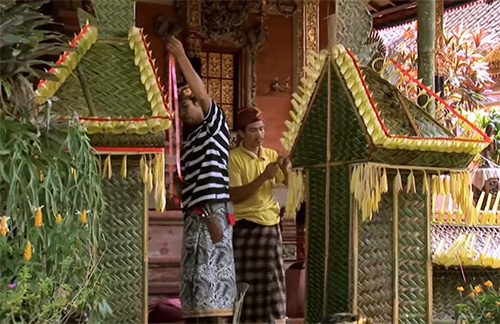
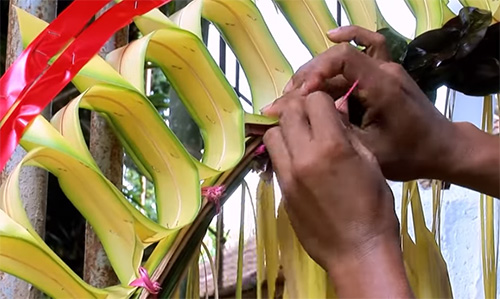
Making these offerings for the royal wedding is an age-old spiritual custom.
The villagers have sculpted a macro cosmos, knowing that the gods and the ancestors will also appreciate the beauty of their art. With the offerings now complete, they're needed at the palace.
It's a rough journey right across Ubud, along dirt tracks and bumpy roads.
The offerings arrive at the palace in bits and pieces.
The royal groom Prince Tjok Gus is on hand to receive the villagers’ wedding gifts.
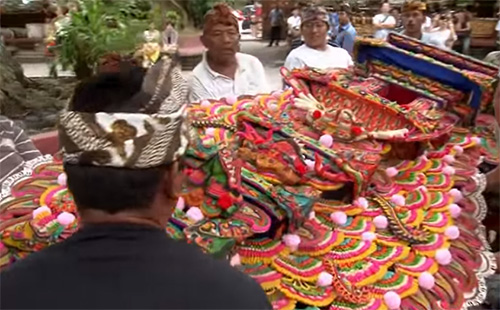
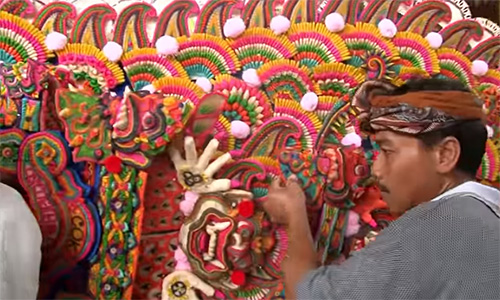
With 2,000 guests expected, prince Tjokorda Raka and princess Asri are making a personal visit to the wedding caterers. Princess Asri is no stranger to organizing large events under pressure. When the terrorists’ bombings struck Bali in 2002, killing and injuring hundreds of tourists and locals, Asri threw herself into helping with the aftermath.
The royal wedding is imminent and the palace is desperate for the forces of nature to come to the party. And it's pouring with rain.
“We'll have rain stoppers on the day, so, hopefully, that will work”, says princess Asri, groom’s mother.
The rain stoppers are Balinese mystics. The groom's older brother has one mystic already at work.
The wedding day dawns at Puri Ubud. In only a few hours time, 2,000 guests will arrive. They’ll witness ancient marriage rituals, unique to Bali. And the pressure is on for Happy, who's never even seen the ceremony before. Happy is feeling more than wedding-day nerves. Her Muslim background hasn't prepared her for the Balinese rituals, the princess Asri also found foreign.
Prince Tjokorda Raka as the head of the royal family arrives for a last-minute inspection.
In another part of the palace, princess Asri is under the ministrations of the bridal salon.
This wedding day is going to be epic for everyone in the royal family. There will be two completely different wedding ceremonies.
Tjok Gus is getting dressed for his ceremony, which is the first part of the wedding ceremony.
“In the morning, they’ll have what's called the ‘basic wedding’. So anyone can have this basic wedding and they can be married”, comments prince Tjok Gde, best man.
With a whole royal family in attendance, the morning ceremony begins. As a village priest officiates, Happy and Tjok Gus enact the ancient fertility rites and age-old customary roles for men and women.
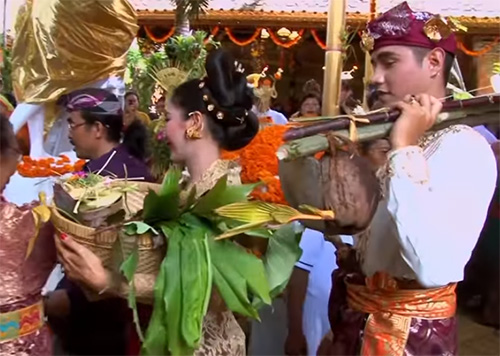
The morning ceremony can be quite amusing. The bride walks around and there's a little whip that the groom whips her with. She walks around 3 times. And it’s all symbolic. She does cooking, she sells things and he buys things. Then, the bride sits on a coconut.
According to Balinese tradition, the couple are now married. But this is no ordinary wedding and grander, royal rituals are about to take place.
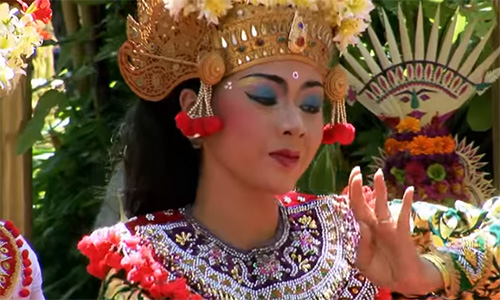
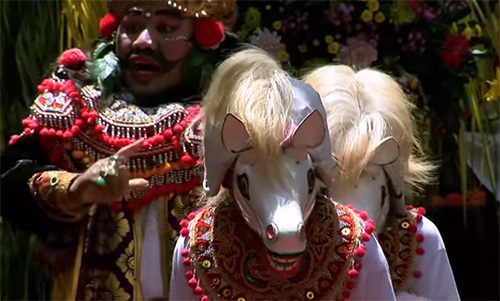
But holding a press conference in the middle of the wedding day isn't a part of royal tradition. When the groom is a prince and the bride – a star, the media won't be denied.
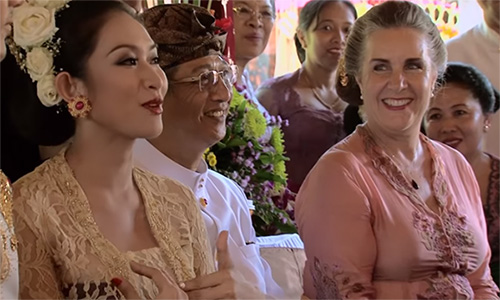
Happy Salma and her father-in-law prince Tjokorda Raka and mother-in-law princess Asri
Like his older brother, Tjok Gus has also married an Indonesian bride.
“They've always steered towards Asian, usually Indonesian, women. Maybe they've seen how difficult it was for me and they wouldn't want to put anyone through that”, says princess Asri, groom’s mother.
But they both married people who aren't Balinese as well, so the brides have to adapt and they have to change a lot.
A whole new guest list of VIPs is arriving to witness the high wedding.
The bride and groom are now been clothed in the full regalia of the royal house of Ubud.
The bride's crown is layers and layers of gold flowers, it weighs kilos when finished.
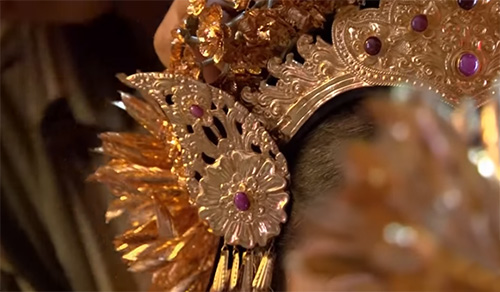
Like his bride’s regalia, the groom will wear the traditional high outfit, only seen in the palace of Ubud. A prince of the warrior caste, he'll wear a royal kris.
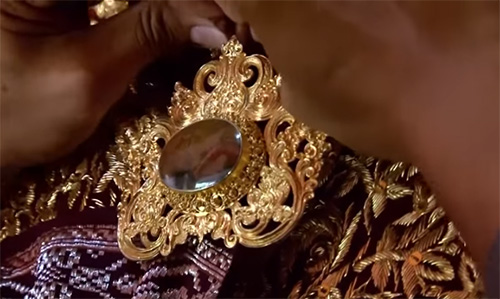
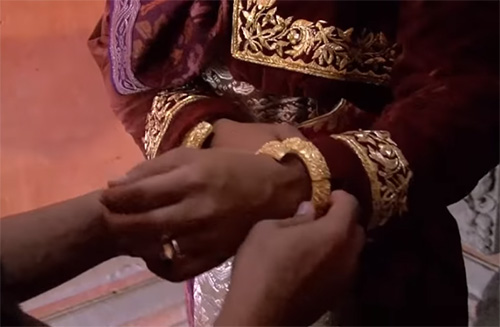
“Kris is a symbolic dagger. They're considered a sacred heirloom. They play a very important part in the life of the palace. Each palace will have almost like an armory of different krises, being handed down by different generations. There's a very mystical, very magical element – the kris’ story. If you ask where they came from, don't be surprised if someone tells you that it flew in a window or popped out of the ground. These types of things happen at certain times in Bali”, narrates prince Tjok Gde, best man.
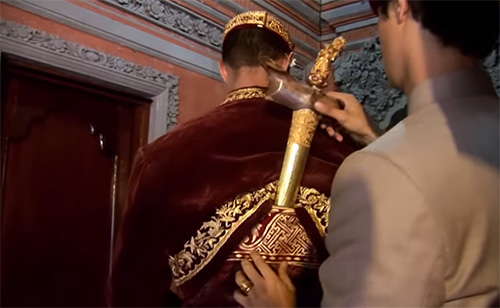
If a royal marries a royal, he gets carried on the shoulders of his helpers, two big strong guys from the village. But if you marry someone who's not from the royal family, you have to walk.
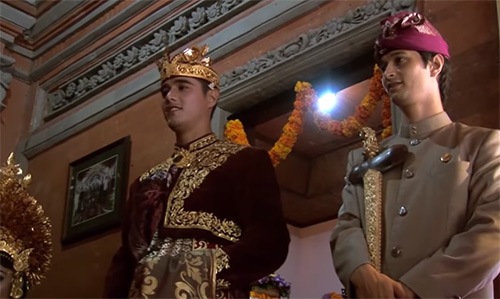
Prince Tjok Gus (groom) and prince Tjok Gde (best man)
With her family watching on, Happy's becoming a Balinese princess. And like her Australian mother-in-law, she's taking on the role of a lifetime.
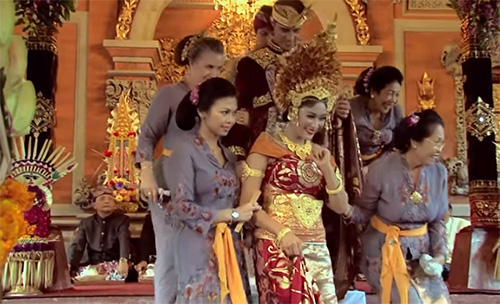
The high-caste Brahmin priest bestows his blessings and holy water on the couple. In this rite of passage, prince Tjok Gus is formally accepting his cultural obligations.
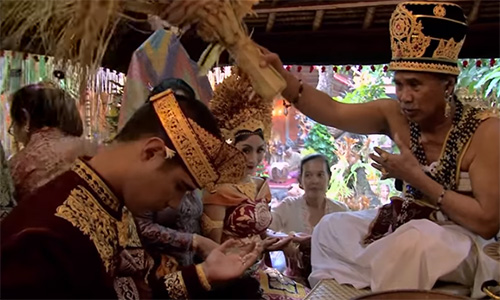
“Happy will find it challenging to be part of Balinese culture. It's quite demanding for anyone who hasn't been born in and bred with it. And for him, I guess that he'll be negotiating throughout the whole thing, which is also difficult”, comments princess Asri, groom’s mother.
Prince Tjokorda Raka has continued a royal dynasty with his Australian princess.
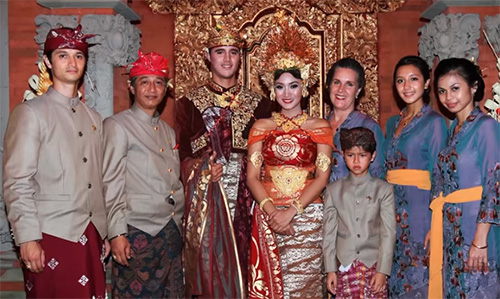
The royal family
“We're all quite good at swapping between cultures. I like to encourage the keeping it Balinese culture”, adds princess Asri, groom’s mother.
Today, their children have chosen to embrace their royal Balinese heritage and live in the modern world.
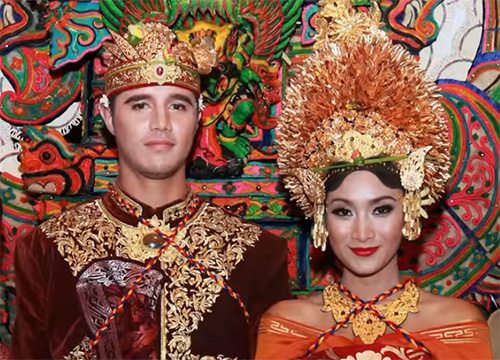
“The most important thing in Bali is the concept of ‘balancing’. Balance doesn't mean stagnation, balance is moving”, says prince Tjokorda Raka, groom’s father.
(c)


Comments
What do you mean? Who is not right and why?